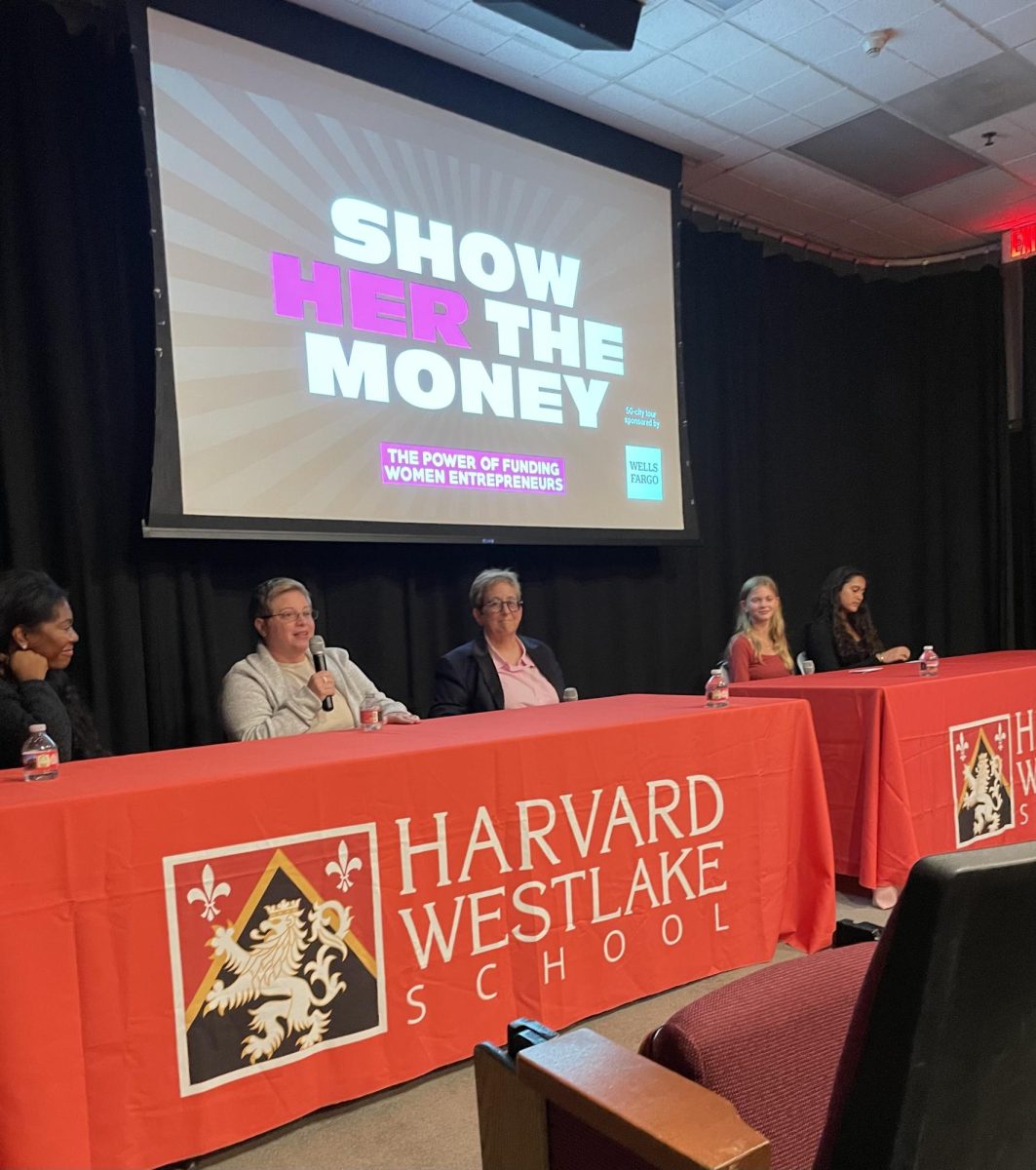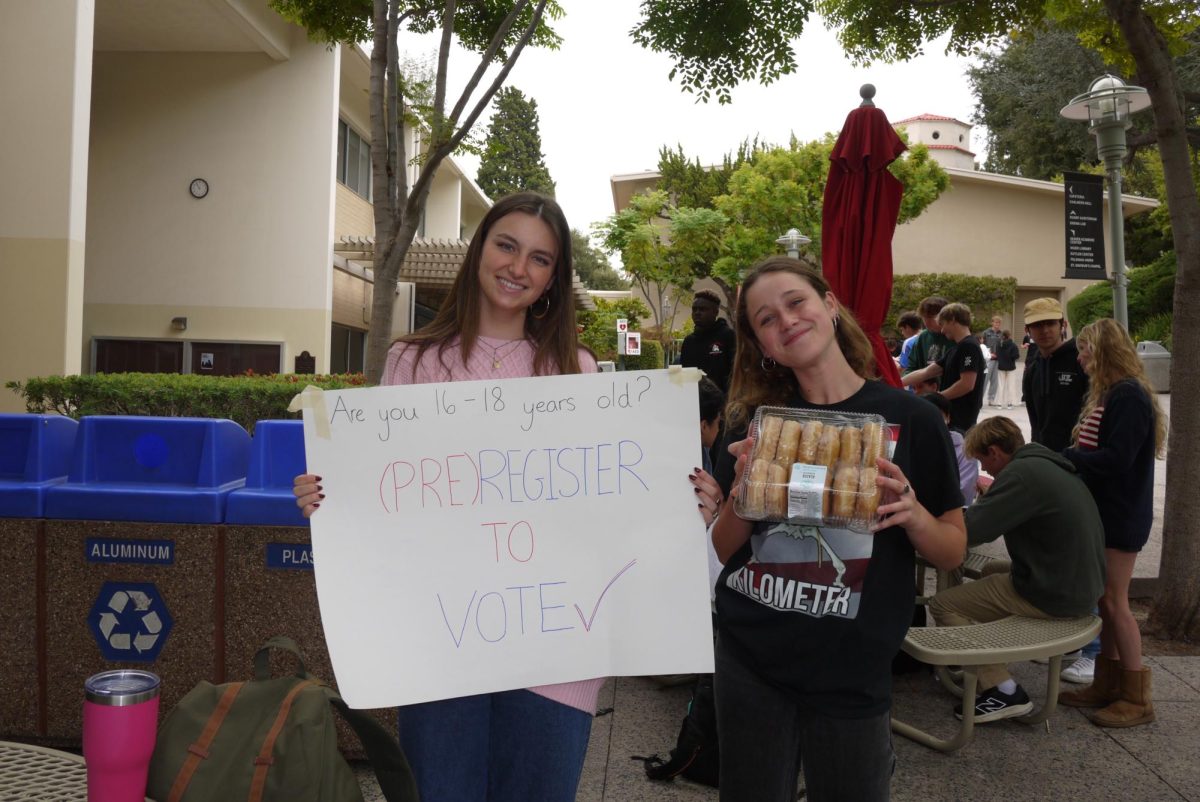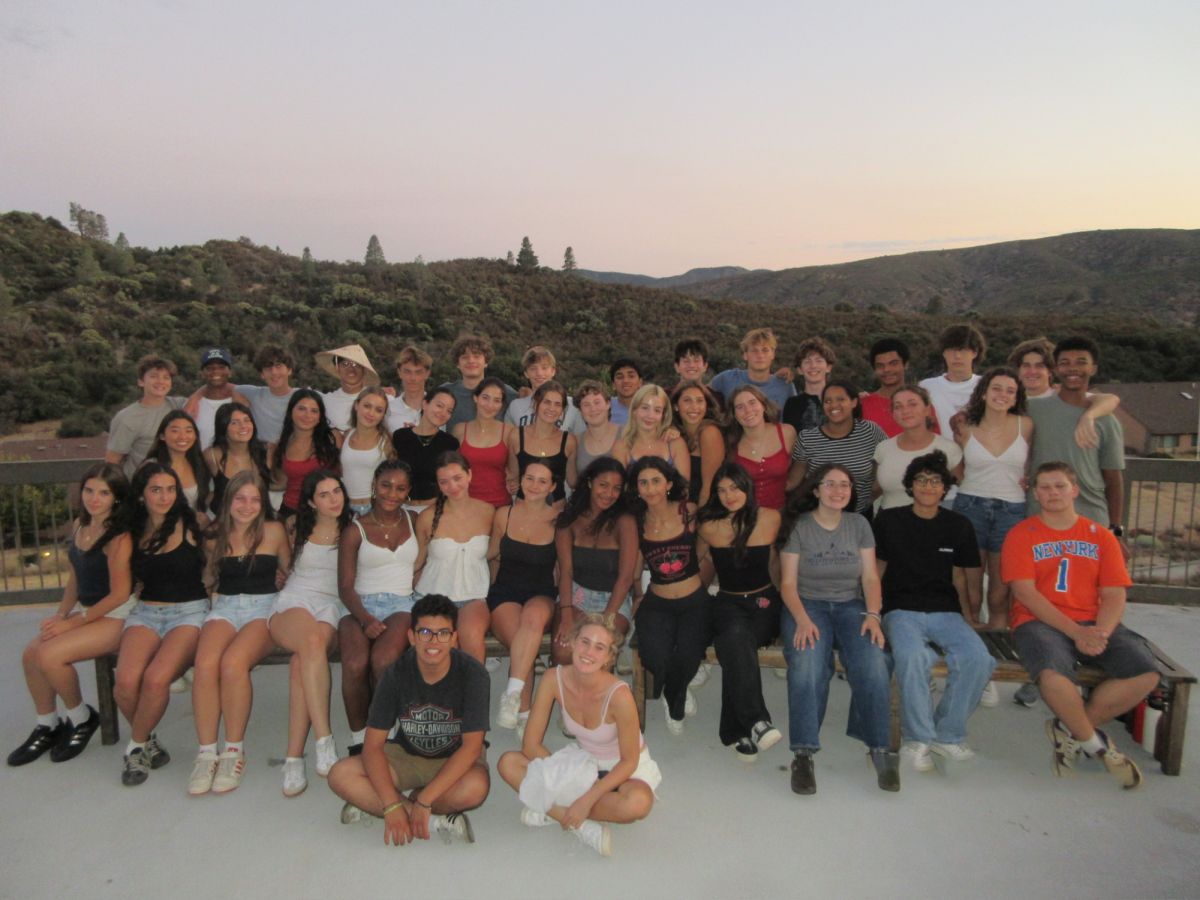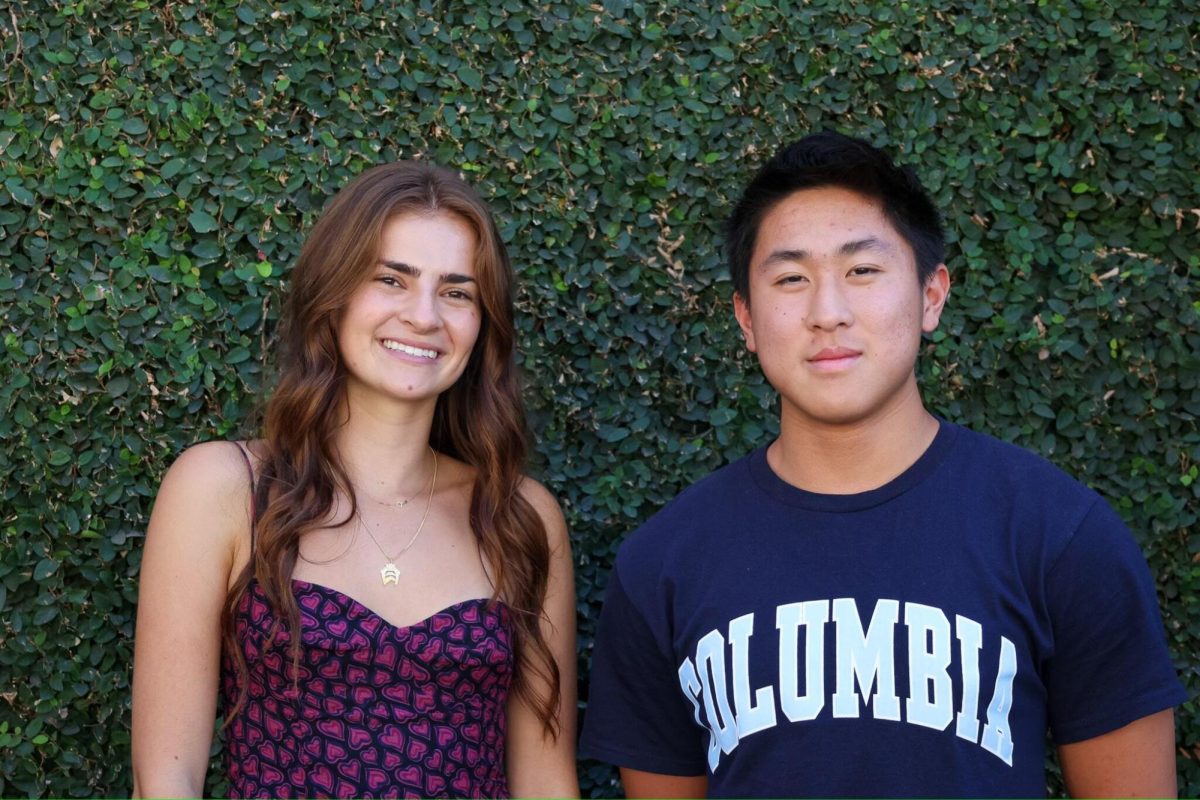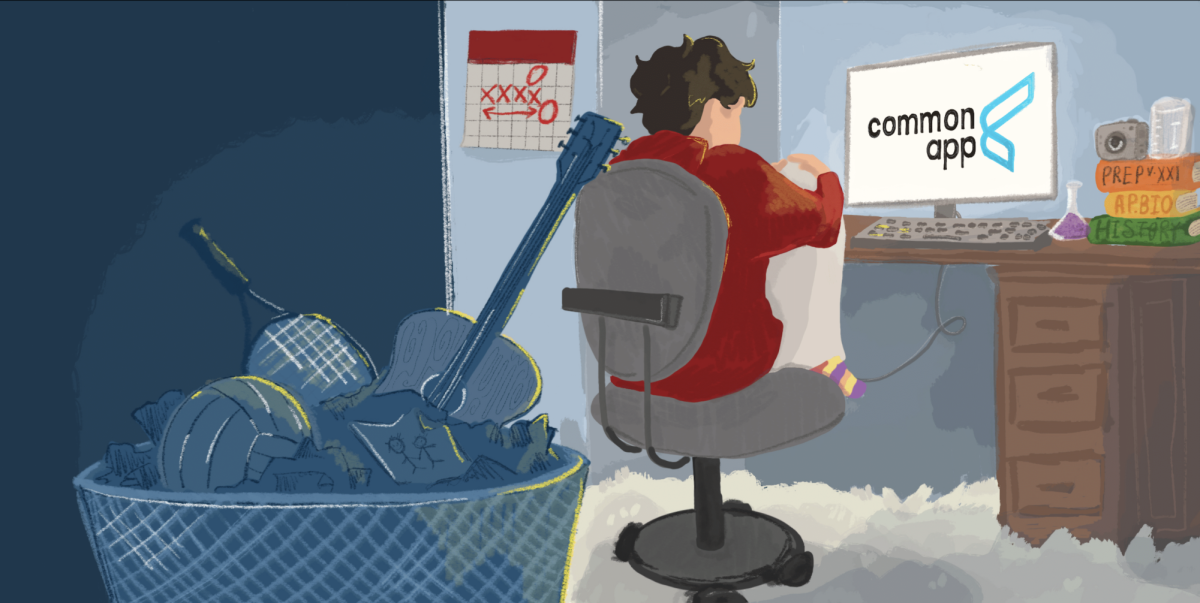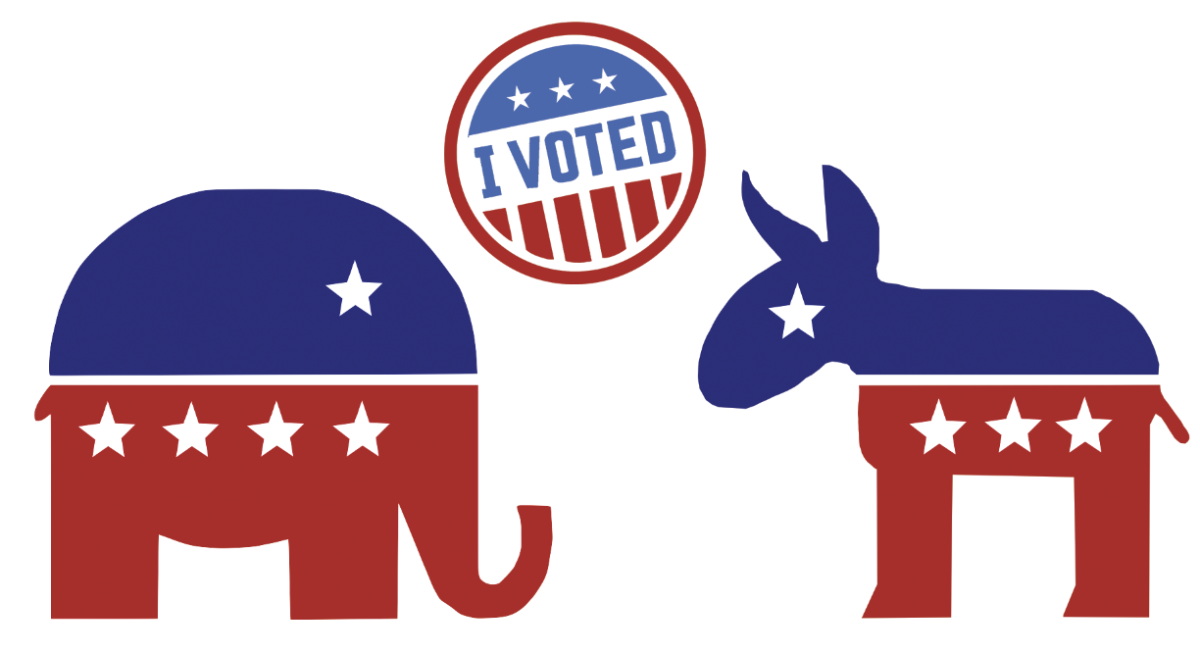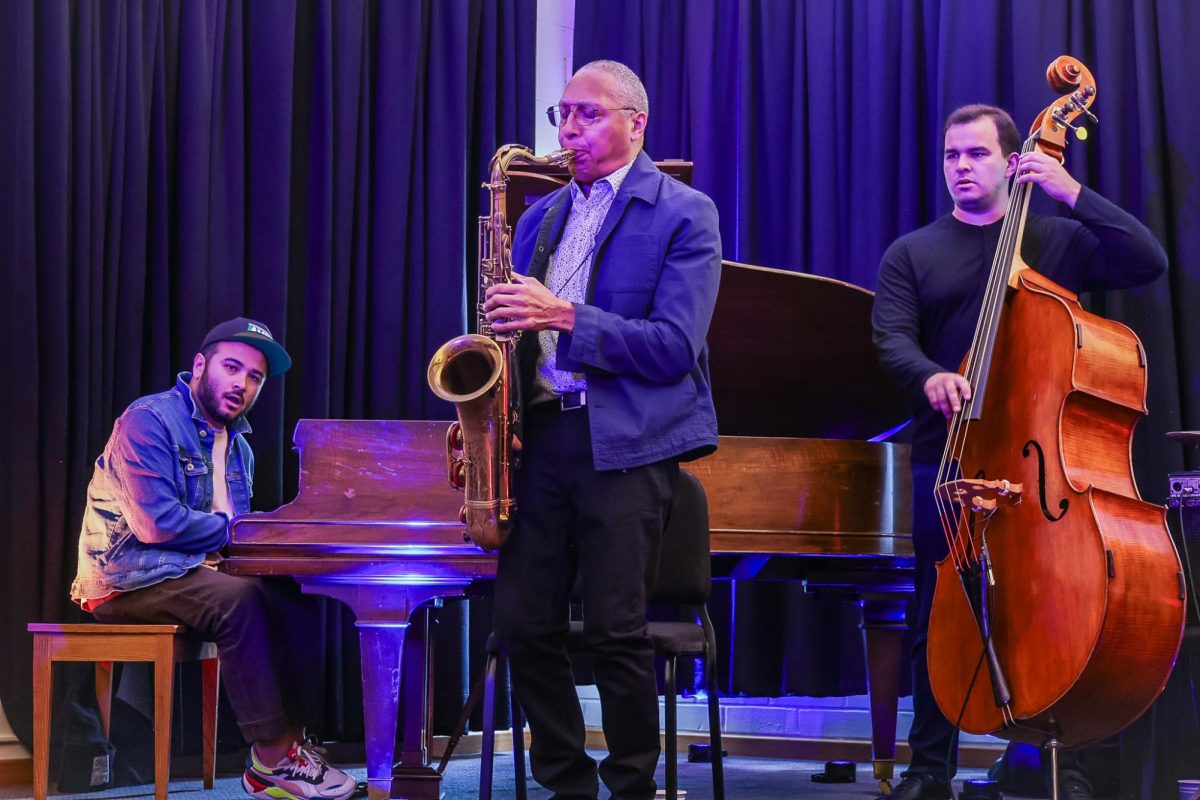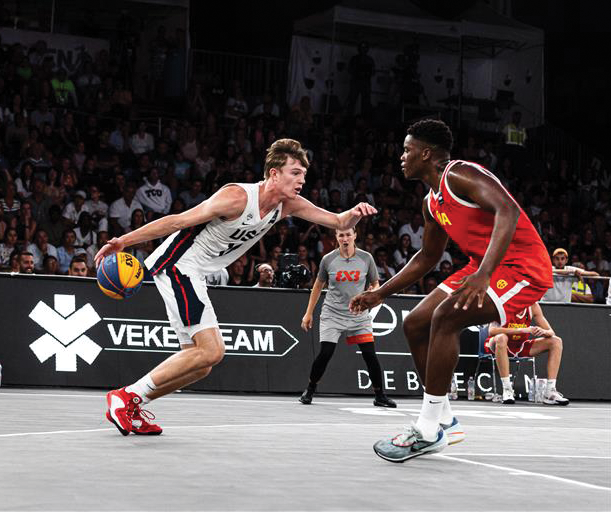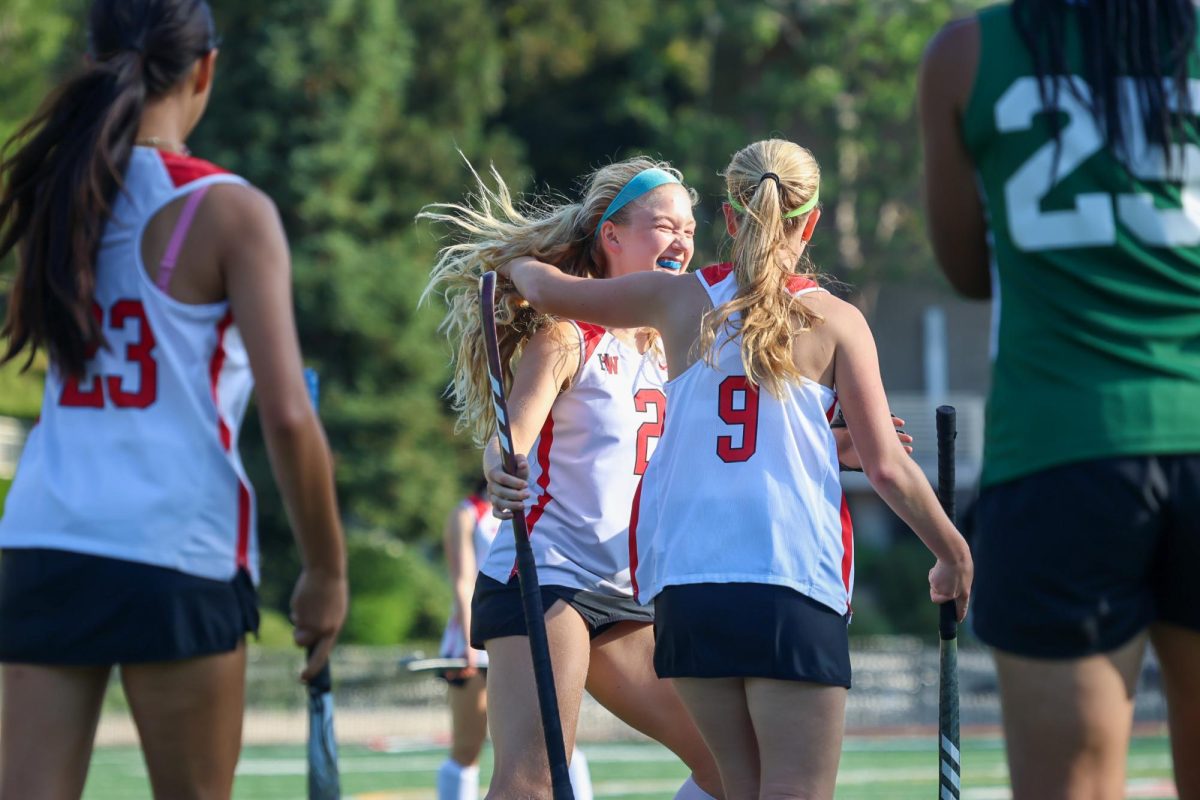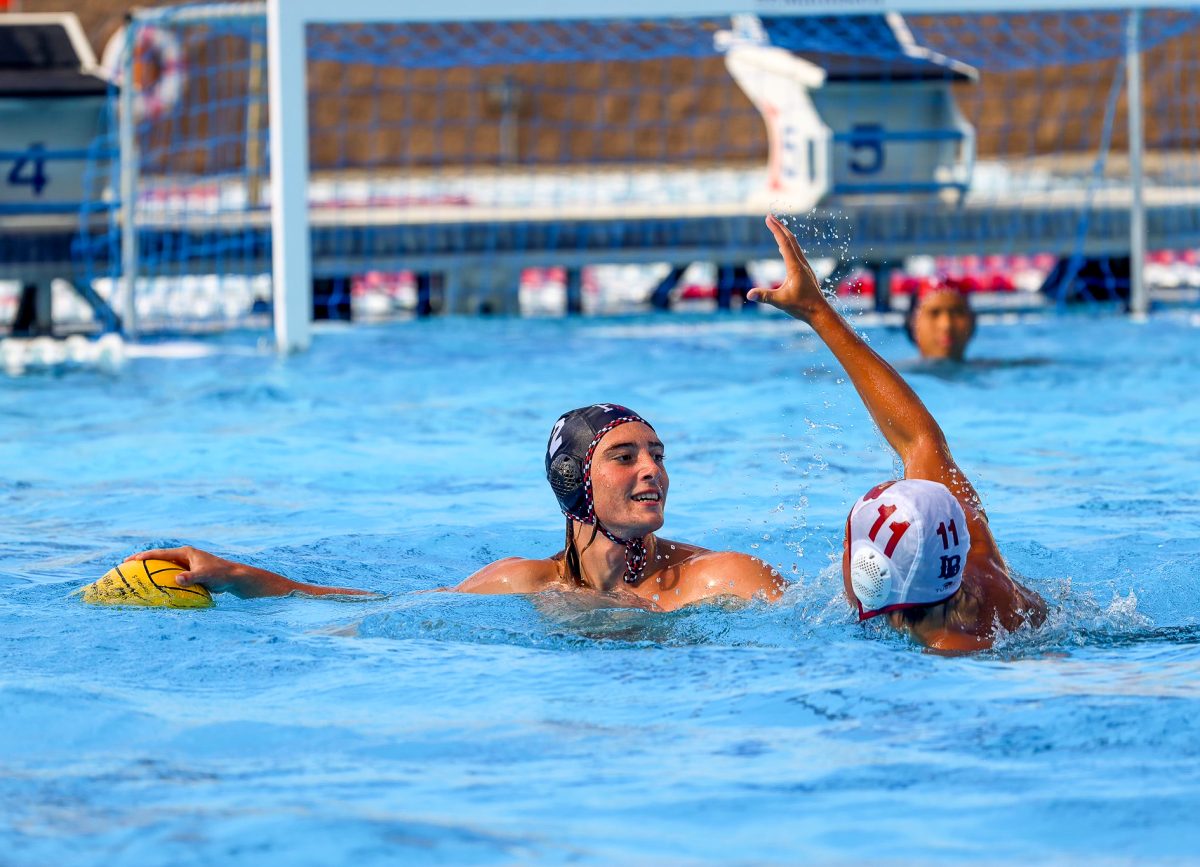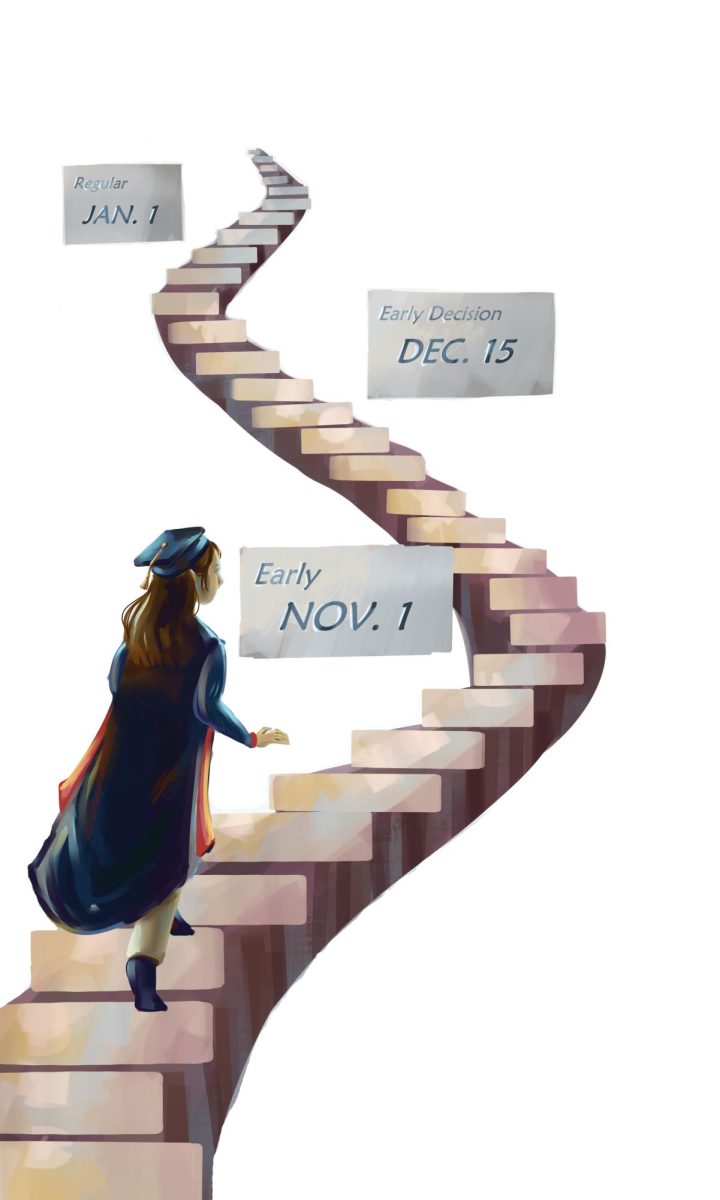Walking onto the Quad on a December morning, Ava Weinrot ’23 could feel the tension among her classmates. It was the day her early decision (ED) result would come out. Only two days away from winter break, many seniors would be hearing back from colleges. In less than twelve hours, Weinrot would be sitting in front of her laptop, refreshing the screen as she awaited her decision from the University of Pennsylvania. But for now, she headed to her first class. Weinrot said many seniors feel stressed about getting into their ED school.
“Everyone was stressed about decisions that day,” Weinrot said. “It was somewhat helpful because I was like, ‘I’m not the only one going through this.’ But at the same time, it didn’t help to calm me down. A few of my close friends’ decisions weren’t coming out the same day, so that was nice because they were a bit calmer. But you could definitely feel a lot of stress and tension at school among the seniors. In the moment, it feels like the stakes are so high when in reality, they’re actually not. Everyone feels like they’re competing against each other.”
Weinrot received her decision on Thursday, Dec. 15, 2022, around the same time that all eight Ivy League schools notified their applicants. Weinrot said she was unable to take her mind off of the decision in the days leading up to it.
“For that whole week, the decision is all you’re thinking about,” Weinrot said. “The way that everyone frames it and even the way that the deans frame it is that so much hangs in the balance with regards to this one decision. The collective mentality, that this holds so much weight in terms of how the rest of your life is going to play out, makes it hard to distract yourself.”
Since ED agreements between students and colleges are binding, when a senior is accepted, they are required to withdraw all other applications. Weinrot said part of the stress surrounding ED decisions can be attributed to the desire to be done with applications.
“Part of the stress comes from wanting to be done [with the application process],” Weinrot said. “I didn’t want to have to spend my winter break working on applications. It’s really not fun. That’s why not getting into your ED hits so hard for people because this could be the end, and you’re almost at the point where you need it to be over so badly. After I didn’t get in, I was upset that I wasn’t done yet. If you really love a school, go ahead and apply early to it, but don’t forget the fact that EDing is not the only option.”
According to a Chronicle Poll of 111 students, only 50% of seniors feel like their teachers understand the specific timeline of the college process. Weinrot said her teachers did not acknowledge the tension surrounding ED decisions.
“Most of my teachers had no idea that decisions were coming out that day [nor] did they acknowledge it,” Weinrot said. “As much as they’re aware of the process going on for the seniors, they’re not as attuned to it as you would think. I honestly liked that they treated it as a normal day because I didn’t want to have to think about it more than I already was. Having my classes feel normal was helpful in terms of trying to take my mind off of it.”
In recent years, it has become common for students across the nation to film their reactions to opening their decisions and post them on social media, according to the Washington Post. Weinrot said she wanted to keep her results relatively private, only sharing them with her family and friends.
“I didn’t want to open my decision with other people,” Weinrot said. “I know people who open theirs at school, but I was absolutely not going to do that. Mine was coming out later in the day anyway, so I was able to go home which was nice. I originally didn’t want to open it with other people, but I ended up opening it with my parents. Later, I talked to my friends about the whole situation. It wasn’t a fun day.”
Last year, there was an increase in the number of reported absences for seniors the day after receiving decisions, according to Student Discipline and Attendance Coordinator Gabriel Preciado. Weinrot said although she did not want to go to school that morning, she was glad that she got to be around her friends.
“When I woke up on Friday morning, I didn’t really want to go to school,” Weinrot said.”But I also didn’t want to be that person who got rejected from a college and then didn’t go to school because they were so consumed by that fact that they couldn’t show their face at school the next day. The day was a little brutal because everyone was talking about it. I think Stanford was coming out that night, so there were a bunch of more people who were stressed. Obviously, I was not happy, so being at school was a bit of an inconvenience, but at the same time, it was nice to be around my friends. I definitely wouldn’t have opened my laptop and started more applications if I had skipped school.”
Weinrot said many of her peers were surprised that she attended school the next day.
“Some people did say to me, like, ‘Oh my God, I can’t believe you came,’” Weinrot said. “But as opposed to what? Sitting at home by myself and being sad? It’s very weird because you go to school the next day, and 50% of these people are absolutely overjoyed, and then 50% of the people are devastated. It’s a polar opposite experience for everyone.”
When ED decisions are released in December, sophomores have not officially started the college process. However, Cayley Tolbert-Shwartz ’24 said when she was a sophomore, her brother, Everett Tolbert-Schwartz ’22, was in the midst of the ED process and could notice the tension between students on decision day.
“Every year, you walk into school, and the Quad is noticeably quieter,” Cayley Tolbert-Schwartz said. “[ED] day was the quietest I’d ever heard it when I was a sophomore. I had a brother applying that year, so I was personally invested. As a junior, I knew more about the process, and I knew more people who were applying.”
Everett Tolbert-Schwartz currently attends Yale University where he was accepted during the ED round of decisions. Cayley Tolbert-Schwartz said she still remembers her brother’s exact reaction to his acceptance.
“Did you get in?’” Cayley Tolbert-Schwartz said. “He just [looked] at me like his soul was just crushed. I was like, ‘What happened?’ He’s like, ‘I got in, but today was so stressful.’ I think the waiting had just hollowed his soul out. He was in complete shock. When we got home, he calmed down, and then he was happy for the rest of winter break.”
Typically, colleges release ED decisions to applicants sometime in the afternoon. Each school is different, but many will send their applicants an email, informing them that there is an update on their application, according to the College Board. Cayley Tolbert-Schwartz said she expects to be anxious throughout the day until she receives her decision.
“When I wake up, I’m gonna check my email, even though I know it won’t be out yet,” Cayley Tolbert-Schwartz said. “Then, I probably will fail to eat breakfast because of the stress. I’ll listen to music in the car so that I don’t have to pay attention to anything going on. In the morning, I’m gonna get on the Quad, and I’m gonna go find my friends, and I’m going to be like, ‘I can’t do this anymore.’ I’m not going to pay attention [in class] at all. My notes will end up covered in random calligraphy because that’s what I do when I’m stressed.”
The school that Cayley Tolbert-Schwartz applied ED to has already announced the date they will be releasing decisions: the Friday before winter break. Cayley Tolbert-Schwartz said she has a plan for how she will open her result and what she will do after.
“On December 15th, Friday, after school, it will probably come out during improv,” Cayley Tolbert-Schwartz said. “Once I see the email, I’m going to step outside and go to this little spot halfway down the stairs from the Drama Lab to Weiler. I’ll just sit there and open it and then if I don’t get in, I’ll probably just leave school and go straight home. But if I get in, I’ll come back and do the rest of improv with a very restrained smile on my face.”
While early application deadlines for most schools are in early to mid-November, most regular applications are due throughout January, according to Coursera. Cayley Tolbert-Schwartz said she will spend her winter break working on applications if she is not accepted into her ED school.
“If I get accepted, I’m gonna go visit my grandparents who live in Colorado,” Cayley Tolbert-Schwartz said. “I’m gonna go skiing, and we’re gonna go shopping. They have this little mall called the Pearl Street Mall, and it’s the cutest thing ever. If I don’t get in, I will be locking myself in my room and writing college apps for two weeks straight.”
After Weinrot was rejected from the University of Pennsylvania, she spent her winter break writing essays and perfecting her applications. With worries about not being accepted to schools in the spring, Weinrot said she applied to many schools that she wasn’t interested in.
“I had worked on a lot of essays over the summer, but I went back to my applications and tweaked a little bit of the storyline,” Weinrot said. “I also somewhat panicked [and] added a bunch of schools to my list which I don’t recommend doing. I remember meeting with my dean the day after my decision came out, and I decided I was just gonna add all these schools because I needed to get into college. One was Cornell which I didn’t want to go at all. I [don’t] know why I wrote a 650 word essay for it, but I felt like I had to just because I was in this manic state. I ended up applying to 22 schools, so I had a lot of writing to do over break. I know that happens for a lot of people, but it is what it is.”
When students are rejected from their ED schools, their dean works with them to develop a plan for their regular applications. If a student is deferred, their dean will help them improve their application for regular decision. Upper School Dean Erik DeAngelis said the deans are prepared to help students navigate the regular decision process if they are deferred.
“There’s a set of standard practices most colleges expect from students [that are] deferred: write a letter of continued interest, submit mid-year grades and update the admission office on any major accomplishments since you initially applied,” DeAngelis said. “By the time a student finds out [that] they’re deferred, we’ve typically talked about a backup plan, so a student can pivot relatively quickly to ED2 or regular decision. That’s our job as deans to counsel and advise students and their families based on our own experiences, access to good information and lean on professional relationships with the colleges.”
When applying ED to a school, students are unable to compare financial aid offers from a variety of schools. Though being unable to afford the school is one of the few reasons students can back out of an ED offer without a penalty, there is still a risk of being unable to afford college, according to U.S. News and World Report. DeAngelis said though colleges do have financial responsibilities to fulfill, the cost of a school should not limit a student’s potential.
“Colleges at the end of the day must operate like a business,” DeAngelis said. “They have a bottom line to meet because they have to pay hundreds or thousands of faculty and staff, build dozens of new fancy facilities and support scholarship and research. ED allows a college to secure ‘no-need,’ tuition paying families to support their bottom line. I was a full financial aid recipient in college, and I knew that my college needed other people to pay in order to support my need for full aid. I always advise that if financial aid is going to be a factor in your process, you should complete the online financial aid calculators to determine if the projected aid you get matches up with what your family expectations are.”
In 2018, a survey by the College Board and Seventeen magazine found that 70% of high school students were stressed about the college process. Sara Segil ’25 said social media contributes to the high stress environment at the school concerning ED decisions.
“Posting on Instagram for your friends’ acceptances just emphasizes the super competitive culture we have here,” Segil said. “Looking as a viewer, when someone posts, they’re making a spectacle out of it. Obviously, getting into any school is a great accomplishment, but it could make other people feel bad and cause tension.”
Some students list the college name in their Instagram bio after receiving their decision. Segil said though she thinks seniors should refrain from posting on their stories, listing a school in their bio is less harmful.
“Since there’s still so much uncertainty, people should try and keep it more to themselves,” Segil said. “No one wants to see an Instagram story of someone else going to your dream school 15 minutes after you were rejected. Putting it in your bio is okay because it’s less in your face, but I think everyone could just be more considerate.”
Weinrot is now a freshman at Dartmouth College. Weinrot said she is grateful for how the process turned out because she ended up at the right place for herself.
“I could not imagine going to the school that I applied early to,” Weinrot said. “I would hate it. I have friends who go there and are so happy, but I don’t think I would have a good experience. I’m extremely grateful, in retrospect, for the way that my process worked out. I love where I ended up, and it really does work out for everyone. For the most part, when a school doesn’t work out, you weren’t meant to go there.”

